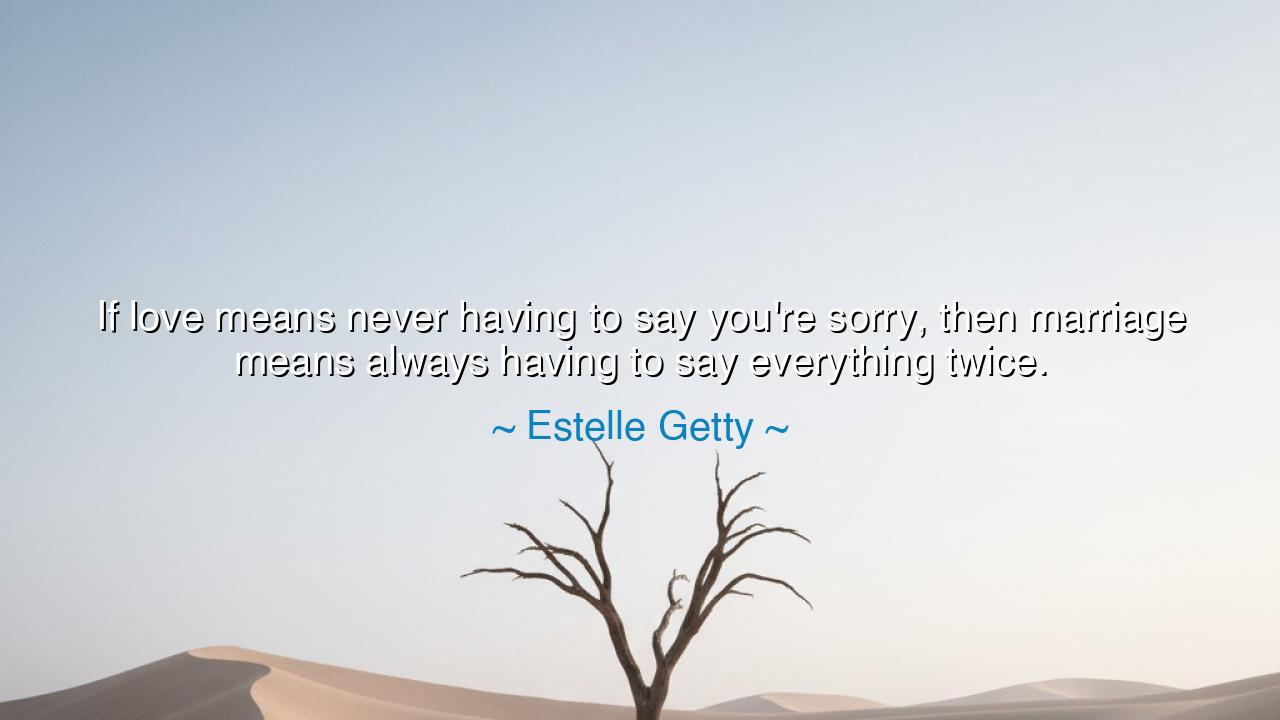
If love means never having to say you're sorry, then marriage
If love means never having to say you're sorry, then marriage means always having to say everything twice.






The words of Estelle Getty, both humorous and wise, echo with the laughter of truth: “If love means never having to say you’re sorry, then marriage means always having to say everything twice.”
In these words, she weaves together wit and wisdom, speaking of the tender struggle between affection and frustration that lies at the heart of every long union. Beneath her jest lies a truth that the ancients themselves would have known — that love is not a silent harmony, but a conversation unending, and that marriage, sacred though it may be, is not the still lake of romance, but the living river of communication. Getty’s humor conceals not cynicism, but deep understanding: that the bond between two souls endures only when words are spoken, heard, repeated, and understood — for it is through this ongoing exchange that love renews itself.
Estelle Getty, beloved for her role as Sophia Petrillo on The Golden Girls, often used humor as her vessel for truth. Her comedic genius was rooted not in mockery, but in empathy; she spoke from the shared experiences of ordinary people. In this quote, she plays upon two great myths of human affection — one born from idealism, the other from realism. The first half of her statement, “If love means never having to say you’re sorry,” is a direct reference to the famous line from Erich Segal’s Love Story, a romantic novel and film of the 1970s that captured the hearts of millions. But Getty, with her characteristic wit, exposes the fragility of that sentiment. Love, she reminds us, is not the absence of apology — it is the willingness to repeat understanding, to try again, to speak again, to explain and to listen, even when patience wears thin.
In this way, her jest is not merely comic; it is profoundly human. To “say everything twice” is the rhythm of married life — a gentle admission that communication between two souls is never perfect. Love does not make two minds identical; it makes them willing to bridge the gap between them, again and again. Marriage, therefore, is not sustained by the fire of passion alone, but by the daily ritual of communication. Words must be spoken not once, but often — not because the other has failed to hear, but because the heart must constantly relearn how to speak the language of another. Repetition, in love, is not failure; it is faith.
The ancients knew this truth well. In the writings of Plato, the union of two souls was seen as the pursuit of wholeness — the joining of what was once divided. Yet, even in reunion, the souls must learn to coexist, to understand, to speak the same truth in different tongues. In the tales of Odysseus and Penelope, we see a marriage tested by distance and time; yet their reunion is not a return to perfection, but the start of rebuilding communication — re-learning the familiar, explaining what years apart had changed. Their love endured not because they were flawless, but because they kept trying to understand each other. So too does Getty’s quote echo this timeless lesson: that communication is the eternal labor of love, and its repetition is not a burden, but a blessing.
Her humor, light as it seems, is also a mirror of endurance. Every marriage, no matter how strong, contains moments of mishearing — words lost in the noise of daily life, intentions misunderstood, emotions unspoken. And so, love demands repetition: the patient restatement of affection, the gentle rephrasing of apology, the reminder that “I love you” must be said again, even if it has been said a thousand times before. In a world that prizes novelty, Getty’s wisdom stands firm — that in love, repetition is devotion, and the willingness to repeat is the true mark of care.
To understand her message is to embrace humility. The myth of perfect understanding must be abandoned; no bond between two humans is free from the need for translation. To say everything twice — and sometimes thrice — is not an act of futility, but of compassion. It means we value the other enough to be clear, to be patient, to make the effort again. It means that love is not sustained by grand gestures, but by the daily, often clumsy, work of mutual understanding.
So, my child, take this teaching to heart. Do not seek a love where words are never needed, but one where words can always be spoken. When you are misunderstood, speak gently again. When you falter, apologize without pride. When silence grows heavy, break it with kindness. Remember that marriage is not perfection, but perseverance, not the quiet of agreement, but the music of continual effort. Estelle Getty, with laughter as her light, reminds us that the secret to lasting love is simple and profound — to keep speaking, to keep listening, and to never grow weary of saying everything, even twice.






AAdministratorAdministrator
Welcome, honored guests. Please leave a comment, we will respond soon